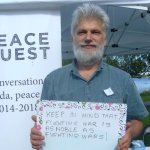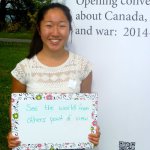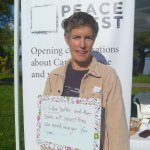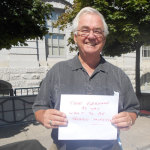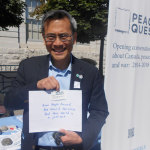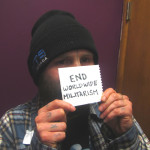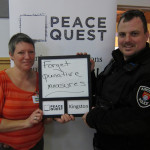PQ Blog: Penpals with Stéphane Dion
Starting in November 2015, PeaceQuest Regina member Ed Lehman had the following correspondence with Minister of Foreign Affairs, Stéphane Dion. He felt it was a relevant part of the national discussion on peace and war and has decided to share it with you here.
November 13 2015
The Honourable Stéphane Dion
Minister of Foreign Affairs
Dear Mr. Dion,
First of all, congratulations on your re-election to Parliament and your appointment as Foreign Affairs Minister. I am sure in the coming weeks and months you will have many opportunities to advance proposals that will indicate Canadian values of peace, disarmament, social justice, and environmentalism have returned to the world stage.
Like many Canadians I was relieved when Prime Minister-elect Trudeau phoned President Obama to say that Canada would no longer be participating in bombing missions in Iraq and Syria. As you know many people across Canada took his statement as an indication Canada is again favouring diplomatic solution rather than killing and maiming. Yesterday, however, when the news media questioned the Prime Minister he talked about a “responsible withdrawal” with no indication of the actual date in sight.
I realize that the you and the Prime Minister have many important files to deal with at this time; not least being the welcoming of 25,000 Syrian refugees to Canada by year’s end. However, Canadians understood that our bombing missions over Iraq and Syria would soon stop. If these missions continue on for months more Canada will be seen as continuing the Harper war first policies. Also, it certainly would not be acceptable for Canada to withdraw from dropping bombs but then engage in other military activity to compensate the U.S. for that withdrawal.
I hope you and the Prime Minister will act quickly so that these bombing missions come to an end soon.
Sincerely,
Ed Lehman
CUPAR, Sk.
Dear Mr. Lehman:
Thank you for your correspondence of November 13, 2015, concerning the fight against the so-called Islamic State of Iraq and the Levant (ISIL). I regret the delay in replying to you.
I appreciate your words of congratulations on my appointment as Minister of Foreign Affairs. I am honoured that Prime Minister Justin Trudeau has appointed me to this position. I will work hard to ensure that our country plays the international role that our people expect. I am also firmly committed to promoting the universal values of human rights, justice, democracy and sustainable development globally.
ISIL’s advances in the summer of 2014 led to tens of thousands of deaths and injuries, and to the displacement of over three million Iraqis and ISIL’s continuing campaign of violence and terror in Iraq remains a great concern to Canada. To this effect, Canada joined and is an active member of the Global Coalition against ISIL, which includes over 60 states aiming to degrade and ultimately destroy ISIL. International efforts in support of Iraqi forces have largely halted ISIL advances in Iraq, but despite this progress, much work remains to be done to defeat ISIL.
Following close consultations with Coalition partners and allies, including the Iraqi government, the Government of Canada is refocusing its role in the Coalition. On February 8, 2016, Prime Minister Trudeau announced Canada’s new strategy to address the crises in Iraq and Syria and their impact on Jordan, Lebanon and the wider region.
The new strategy is focused on helping build the conditions on the ground for longer-term stability and prosperity. Under this strategy, the Government of Canada will invest approximately $1.6 billion over three years for the region.This includes $840 million in humanitarian assistance and $270 million in long-term development assistance ($130 million of these being for current operational project commitments). The remainder consists of $145 million for stabilization and security assistance and $305 million for military assistance.
Canada’s military mission is being refocused, to cease air strike operations, but to continue its air support by refueling and surveillance aircraft. Canada will also significantly increase training for local forces in Iraq to help them take full responsibility for their country’s security, and provide additional military equipment.
In addition to its military contribution, Canada will continue to contribute to stabilization efforts and counterterrorism measures, including helping cut off ISIL’s access to financing and funding, countering the ISIL propaganda, and stemming the flow of foreign terrorist fighters. Canada’s contributions will build on the successes of the Coalition, and further complement and enhance the efforts of our Coalition partners.
Working with experienced partners, Canada’s humanitarian assistance will help meet the basic needs of those hardest hit by the conflicts, by providing life-saving support to the most vulnerable, including refugees, internally displaced people, children and victims of sexual and gender-based violence.
To foster longer-term development, Canada will help increase the resilience of countries and communities coping with the pressures of hosting large numbers of refugees and displaced people. Canada’s assistance will also help build local capacity to provide basic social services, maintain and rehabilitate public infrastructure, foster inclusive growth and employment and advance inclusive and accountable governance.
Canada will also increase its diplomatic presence in the region to help implement this new strategy and engage more actively in conflict-resolution efforts.
Canada’s refocused contribution is comprehensive, integrated and sustained, with a renewed emphasis on building local capacity through training, ensuring effective humanitarian assistance, and working with local communities to meet long-term development needs in the region. This whole-of-government approach will help to enhance security and stability, provide humanitarian assistance, and help partners deliver social services, rebuild infrastructure and ensure good governance.
You may find more information about Canada’s efforts to counter ISIL at
http://international.gc.ca/world-monde/security-securite/isis-eiis/index.aspx?lang=eng.
Thank you for writing.
Sincerely,
The Honourable Stéphane Dion, P.C., M.P.
Minister of Foreign Affairs
Minister of Foreign Affairs
Dear Mr. Dion;
Thank you for your letter of April 27 responding to my letter (November 13th, 2015) urging the Canadian government to withdraw from Syria and Iraq.
Under normal circumstances I would be reassured by your statement: “I am firmly committed to promoting the universal values of human rights, justice, democracy and sustainable development globally”.
However you also state: “Canada’s military mission is being refocused, to cease air strike operations, but to continue its air support by refueling and surveillance aircraft.”
During the federal election Canadians from coast to coast understood that if your party became government the bombing by Canada of Syrian targets would stop. We did not understand that to mean a military presence by Canada of assisting others to continue bombing missions would take the place of Canadian bombing.
Also, if Canada is to promote “the universal values of human rights, justice, and democracy . . . ” we fail to comprehend why Canada is proceeding with the single largest arms deal in Canadian history to Saudi Arabia. This 15 billion dollar deal to a serious violator of human rights is not a contribution to peace in the Middle East.
However disturbed we may be by the continuation of Canada’s illegal military presence in Syria and the sale of arms to Saudi Arabia your government has given us an even bigger reason to be alarmed. During the course of the federal election Stephen Harper indicated that if re-elected he was prepared to consider Canada joining the Ballistic Missile Defence program of the United States. Now, that is one of the themes of the Defense Review being conducted by the Defence Minister.
Twice Canadians have rejected Canada being part of the American effort to take war into outer space.
Twice Canadians have said that Ballistic Missile Defence does not work and that the world needs disarmament rather than further arms escalation.
Out here in Saskatchewan we find it very odd that on the one hand we are told the public is being encouraged to participate in the defence consultations and yet there are no hearings planned for Saskatchewan. Unlike the armament salesmen we do not have the resources to fly to hearings in other provinces.
We urge you to initiate a foreign policy review based on the idea of Canada contributing to a world at peace. The war first strategy of the Harper government did not work. It did not work in Afghanistan, Libya, or Syria. The answer to a strategy that did not work in these countries is not Star Wars.


